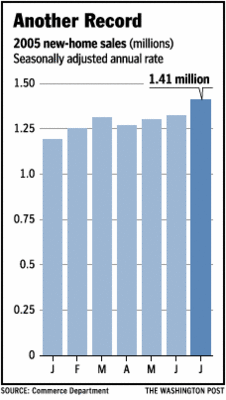New Data, New Record In a Housing Market That Defies Predictions

By Sandra Fleishman Washington Post Staff Writer Thursday, August 25, 2005; D01
So which direction is the housing market headed in, anyway?
On Tuesday, some analysts said the boom was definitively going south, based on a report from the National Association of Realtors that sales of existing homes slipped 2.6 percent from June to July.
Yesterday, however, the Commerce Department reported that new-home sales hit a record high in July, up 6.5 percent from June. That sent some pontificators the opposite way, saying the boom lives on.
What's going on? Is a housing "bubble" about to burst or not?
Some who have been predicting a gradual slowing of the robust housing market rather than a dramatic pop say they remain upbeat because mortgage rates are holding steady and because July's dip in existing-home sales was small and its jump in new-home sales strong.
The doomsday talk about Tuesday's numbers was "laughable," said Mark Vitner, vice president and economist with Wachovia Securities. "The drop was not even statistically significant. Next month, we may find out that sales [of existing homes in July] were actually up."
Analysts who have been seeing darker clouds ahead, however, say the reports do not allay their fears. They cite not only the drop in sales of previously owned homes but also data showing an increase in inventory of such homes, to the highest level since 2003, and a 5 percent drop in sales of condos.
And they note that the Commerce Department yesterday found that median sales prices of new homes had fallen for the third time in a row, to the lowest since December 2003.
Dean Baker of the District-based Center for Economic and Policy Research, who predicted a stock market collapse in 1997, three years before it hit, said the contradictory numbers do not reassure him. "I still make the same analogy with the stock market," he said. "I saw the bubble for technology and I saw that it would come, I just couldn't say when it would happen. . . . If you ask me when it will happen for housing, I can't tell you either."
He said, "If we get a big jump in interest rates . . . that would probably very quickly put a damper on the housing market. If mortgage rates stay more or less where they are, my guess is that it will take longer."
Part of the uncertainty lies in the numbers themselves.
The Commerce Department, for instance, extrapolates how many new homes are sold by sampling each region each month on the number of purchase contracts signed.
The Realtors data lag behind the Commerce data. The group adds up settlements on existing homes each month for houses that went under contract a month or two earlier.
On top of that, there are some anomalies within the data.
Even the chief economist for the National Association of Home Builders, David F. Seiders, said he does not believe the Commerce Department's new-homes numbers for July because they are so at odds with other estimates and with the builders' surveys of its members.
July's report "is probably a non-credible number," Seiders said. "I am taking these . . . numbers with a grain of salt and pleading for more time to understand what's going on."
In particular, the estimate that new-home sales jumped 36 percent in the West is "an outlandish number," Seiders said.
Nationally, Seiders was "expecting a modest decline" in July.
Seiders did not challenge the Commerce estimate that July sales dipped 3.5 percent in the South, which includes the Washington area, and 13.5 percent in the Midwest. Sales rose 10.1 percent in the Northeast, the Commerce Department said.
"I don't want to suggest that the market isn't strong," Seiders said, "but in the context of other information for the month, I don't see it performing" at a record level.
The housing market is "truly flattening," he said. "Whether we are starting to erode or not is hard to tell, but we could be on the edge of the market starting to lose some ground."
Wachovia's Vitner disagrees. "Everybody is just itching to pull the trigger and say that the housing bubble has just burst, but my contention is that there is no housing bubble, there's just been a mismatch between supply and demand." In past months, he said, prices climbed because builders could not meet demand, but the newest numbers, showing more sales and lower prices, indicate that builders have been able to step up production.
With a "better balance between supply and demand," Vitner predicted that there would be "more modest gains in prices in the latter part of this year and throughout 2006."
The Commerce report said the median price of a new home dropped 7.2 percent, to $203,800 in July from $219,500 in June and was 4 percent below a year ago. The sales price was the lowest since December 2003, when it stood at $196,000.
Baker said the new-homes total for the West appears to be "an anomaly" and if it is in error, the government's estimate that inventory of new homes is declining would also be wrong.
He sees "a creeping, gradual weakening of the market."
But Baker said that before he draws any conclusions about the market, he would have to "see the data go in the same direction two months in a row."
He said, "If it does that, it's probably real."

0 Comments:
Post a Comment
<< Home